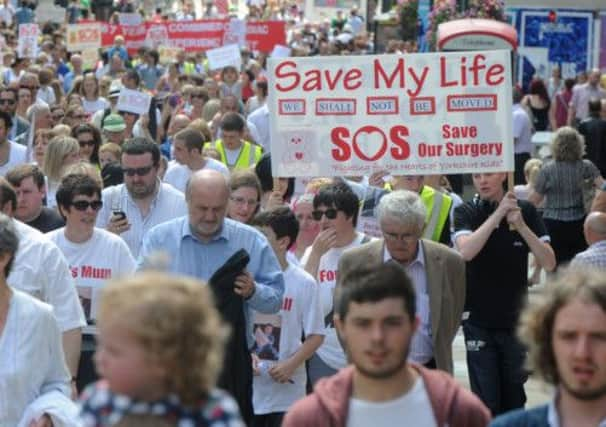Stuart Andrew: Betrayal and bias over future of child heart unit


So much so that at the end of last year the Health Secretary stepped in and commissioned the Independent Reconfiguration Panel (IRP) to reassess the decision and decision-making process, and provide him with their findings by the end of March.
It is running in parallel to a legal challenge brought by campaigners in Leeds, which concluded at the High Court on Monday with a decision expected in the coming weeks.
Advertisement
Hide AdAdvertisement
Hide AdAs part of its review, the IRP came to Parliament last week and heard the views of a cross-party delegation of Yorkshire MPs and peers who have put aside party and area interest to speak as one in favour of retaining the Leeds unit that currently serves our region.
The arguments in favour of the unit are well-known: it is centrally located for the major population areas of South and West Yorkshire along with the Humber and it serves a regional population of five-and-a-half million people.
Moving children’s heart surgery to Newcastle, which lies in a far less populated region (2.6m), means significant additional journey times and costs for Yorkshire families as well as increased stress and strain on family life at an already difficult time. For time critical transfers, clinicians have even warned that the decision “exposes a number of children to the risk of death”.
Crucially, the Leeds unit is widely acknowledged to offer excellent quality care. What also sets Leeds apart from all but one of England’s other units is that it has the full range of inter-dependent surgical, maternity and neo-natal services all on one site. It is very common for sick children to have multiple problems, requiring the sometimes very urgent attention of other paediatric specialists.
Advertisement
Hide AdAdvertisement
Hide AdWhile at Leeds these are all on one site, the Newcastle unit is almost three miles away from other paediatric facilities. This may not seem far, but it means a specialist responding to a call from the children’s heart surgery unit having to get to their car and drive across Newcastle city centre, perhaps in rush hour. For this reason, 170 Yorkshire clinicians have written to the IRP saying that they would not be happy to refer patients there.
Ultimately, the decision reached by the Joint Committee of Primary Care Trusts (JCPCT), which concluded the Safe and Sustainable Review of children’s heart surgery services last summer, will leave Yorkshire with a worse children’s heart surgery service. This is tantamount to a betrayal of the promise of the review as far as Yorkshire is concerned, which begs the question: why was such an improbable decision made?
The illogical outcome has meant that the process used to reach it has since come under formidable scrutiny. Or rather I should say attempted scrutiny, for some of the bodies behind the review have proved obdurate in the face of information requests not just from MPs but also from Councillor John Illingworth, chairman of Yorkshire’s Joint Health Overview and Scrutiny Committee, a body which is specifically tasked by Parliament to scrutinise the review on behalf of our region.
Outstanding information includes, among other things, full minutes of meetings where key decisions were made as well as the breakdown of the individual scores awarded to units in the early stages of the review. These scores were used (contrary to their intended purpose) to rank units and proved pivotal to the JCPCT’s eventual decision, yet we’ve no idea how they were arrived at.
Advertisement
Hide AdAdvertisement
Hide AdInformation which has come out goes some way to explaining why the JCPCT reached the decision it did. This concerns an obvious regional bias against Yorkshire and the Leeds unit in terms of recruitment and expenditure by the various bodies advising the JCPCT and administering the review, whose day-to-day job is to commission specialised services.
For instance: Yorkshire has about 10 per cent of the relevant UK population but representatives from our region made up barely one per cent of these bodies. Expenditure on these services in the North East was £13.96 per person, the second highest in the country and more than four times higher than the £3.35 per person for Yorkshire. This should, I believe, be a matter for further investigation.
My Parliamentary colleagues and I were pleased to put these points to the IRP.
I would now urge readers to do likewise by writing to them at IRP, 6th Floor, 157-197 Buckingham Palace Road, London SW11W 9SP, to make sure our region gets the quality children’s heart surgery service it deserves.